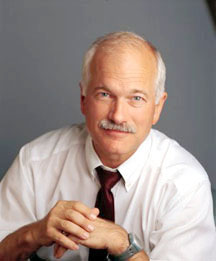OTTAWA, (Reuters) – The left-leaning New Democratic Party has exploded from an also-ran in Canada’s election campaign to a potential spoiler that could change the Canadian balance of power.
All polls show a surge in support for the NDP, which advocates higher corporate taxes, more social spending and an early withdrawal from Afghanistan, and one showed the party ahead of the Liberals, which has been the major opposition party.
A strong NDP showing could help the governing Conservatives if it splits a left-leaning vote between Liberals and New Democrats, or between New Democrats and the separatist Bloc Quebecois in Quebec, allowing a Conservative candidate to win a race with well under half the vote in an individual district.

But the polls don’t guarantee the Conservatives the support they need to win a majority government, and the NDP could also wrest seats from the Conservatives, bringing the likelihood of a third consecutive Parliament where the Conservatives are the largest party but support from others to stay in power.
“It seems clear that the public aren’t leaning to give Mr. Harper his majority,” said Frank Graves, whose EKOS survey showed the NDP tied with the Liberals.
His automated telephone poll has the Conservatives at 34.4 percent, down three points in three days, ahead of the NDP and the Liberals who are tied at 24.7 percent.
For the first time, the NDP leads the Bloc Quebecois in the French-speaking province of Quebec.
“This steady progression from also-ran to contender has been a smooth and steady,” Graves said, adding that he was unsure if the gains could be sustained or expanded.
An Ipsos Reid survey released late on Thursday indicated the NDP may have pulled ahead of the Liberals, with 24 percent to 21 pecent of decided voters. The survey showed the Conservatives firmly ahead with 43 percent.
The survey found the NDP with a slim lead over the Bloc Quebecois in Quebec, which is the only province where the Bloc runs candidates.
The NDP gained support after last week’s two leaders’ debates, posing a dilemma for the Liberals, who describe themselves as the only party that can oust the Conservatives.
“The federal NDP has never formed a government in the history of Canada,” Liberal leader Michael Ignatieff said yesterday. “That’s just a fact, and we’re in the business on the 2nd of May of choosing governments.”
The response from NDP leader Jack Layton was cutting: “This is really the least attractive part of the Liberal Party. They just assume they’re the only choice and Canadians just have to go along with them in government.”
Layton came across in the debates as an affable person who wonders why Ottawa just can’t look out for the small guy.
Most assumed he would never form a government, and his platform faced less scrutiny than that of his rivals.
“The NDP platform seldom gets a costed look. It’s a pastiche of guesses and conjectures,” Globe and Mail columnist Jeffrey Simpson wrote this week.
The NDP proposes to raise corporate taxes to 19 percent from 16.5 percent while cutting taxes for small businesses. It would spend more, but still balance the budget in four years.
Canada’s first-past-the-post voting system gives representation to the individual who wins the most seats in each electoral district, so a vote for the NDP has often been seen as a wasted vote in many districts.
But analysts say there can be a tipping point where the party suddenly becomes competitive, and the Ipsos survey found the NDP was the second choice of both voters who said they supported the Liberals and those support the Conservatives.
Half of Bloc voters picked the NDP as their second choice, the Ipsos survey said.
Conservative Prime Minister Stephen Harper has repeatedly warned that if he does not get a majority, the other three parties will form a coalition — formal or informal — to block the Conservatives and put the Liberal Party in power.
If the NDP ends up with more seats than the Liberals, Layton would suddenly have potential to become prime minister.
Pollster Nik Nanos said Layton would gain “moral authority” if the NDP and the Liberals got comparable percentages of the vote, even if the Liberals ended up with more seats.
The NDP lags the Liberal Party by five points in Nanos’ latest survey. But support for it has also jumped by that same amount in just two days. Nanos has the Conservatives more than 12 points higher than the Liberals at 39.0 percent.
Graves said his polling points to the Liberals and the NDP together having roughly as many seats as the Conservatives.




